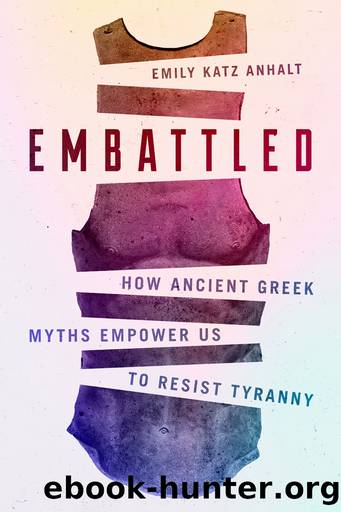Embattled by Emily Katz Anhalt

Author:Emily Katz Anhalt
Language: eng
Format: epub
Publisher: Stanford University Press
Published: 2021-10-15T00:00:00+00:00
We know, as Aeschylus and his contemporaries did, that thereâs an alternative. The Athenian lawgiver Solon established the trial by jury in 595â594 BCE, nearly a century before the advent of democratic government. But this solution was still controversial and divisive when Aeschylus produced the Oresteia in 458 BCE. Even today, the short-term satisfactions of vengeance continue to appeal to many people. A good legal procedure is fine, but it only works if everyone understands that it is necessary, that it is better than violent retaliation to violent crime, and that it operates fairly.
But how do you convert the traditional certainty that vengeance equals justice into a new understanding of justice as a communal legal procedure? Even after you have institutions in place, how do you get everyone to accept judicial outcomes whether they like them or not? You need a good story. And the Greeks had plenty. From the late sixth throughout the fifth century BCE, Athenian tragic plays reenacted, with revised details and emphases, ancient tales long familiar from epic poetry. New versions of old tales sparked reassessment and debate. Athenian tragedies helped to expose the destructiveness of the traditional tribal goals of helping friends, harming enemies, and pursuing vengeance. They promoted new ideals more conducive to preserving civil society and democratic institutions.
Although ancient Greeks were often suspicious of change (their word for ânew,â neos, also meant âunexpected, strange, evilâ),1 Aeschylusâs Oresteia directly challenges the traditional view, emphasized in the Odyssey, that Orestesâs vengeance on his fatherâs murderer is morally correct and unquestionably admirable. Produced exactly a half century after the establishment of democratic government in 508 BCE, and nearly a century and a half after Solon instituted jury trials, this trilogy traces the causes and consequences of a series of reciprocal vengeance killings. The first two plays (Agamemnon and Libation Bearers) emphasize the escalating violence. The third play (Eumenides) validates the jury trial as an imperfect but preferable alternative.2
Hundreds of years before Aeschylus produced the Oresteia, the Iliad and Odyssey began to question the usefulness of vengeance, but both epics nevertheless present revenge as fully compatible with and necessary to good social order. The Odyssey especially implies that revenge can be essential, constructive, and admirable. Odysseusâs successful homecoming and his vengeance on the suitors marks the accomplishment of Zeusâs justice.3 Agamemnonâs homecoming is notably less successful, but the Odysseyâs characters insist that his son Orestes admirably and justly avenges his fatherâs death by killing the murderer. The Odyssey says nothing about Orestes killing his mother Clytemnestra as well. Gods and mortals in the epic all view Orestes as a dutiful, exemplary son. His vengeance is morally unproblematic and thoroughly praiseworthy.4
While the Odyssey presents Agamemnonâs murder as an unambiguous injustice and commends Orestesâs act of vengeance, the Oresteia shows instead that the traditional definition of âjusticeâ as âvengeanceâ constitutes a problemâfor everyone. By changing crucial details, Aeschylus undermines the Odysseyâs unquestioning admiration for Orestes. In Aeschylusâs retelling, Orestes achieves nothing glorious or praiseworthy by avenging his fatherâs death.
Download
This site does not store any files on its server. We only index and link to content provided by other sites. Please contact the content providers to delete copyright contents if any and email us, we'll remove relevant links or contents immediately.
| Anthropology | Archaeology |
| Philosophy | Politics & Government |
| Social Sciences | Sociology |
| Women's Studies |
Cecilia; Or, Memoirs of an Heiress — Volume 1 by Fanny Burney(31333)
Cecilia; Or, Memoirs of an Heiress — Volume 3 by Fanny Burney(30934)
Cecilia; Or, Memoirs of an Heiress — Volume 2 by Fanny Burney(30889)
The Great Music City by Andrea Baker(21323)
We're Going to Need More Wine by Gabrielle Union(18074)
Bombshells: Glamour Girls of a Lifetime by Sullivan Steve(13109)
Pimp by Iceberg Slim(12933)
All the Missing Girls by Megan Miranda(12753)
Fifty Shades Freed by E L James(12451)
Norse Mythology by Gaiman Neil(11885)
Talking to Strangers by Malcolm Gladwell(11880)
Crazy Rich Asians by Kevin Kwan(8351)
Mindhunter: Inside the FBI's Elite Serial Crime Unit by John E. Douglas & Mark Olshaker(7835)
The Lost Art of Listening by Michael P. Nichols(6474)
Enlightenment Now: The Case for Reason, Science, Humanism, and Progress by Steven Pinker(6407)
Bad Blood by John Carreyrou(5770)
The Four Agreements by Don Miguel Ruiz(5511)
Weapons of Math Destruction by Cathy O'Neil(5038)
We Need to Talk by Celeste Headlee(4871)
